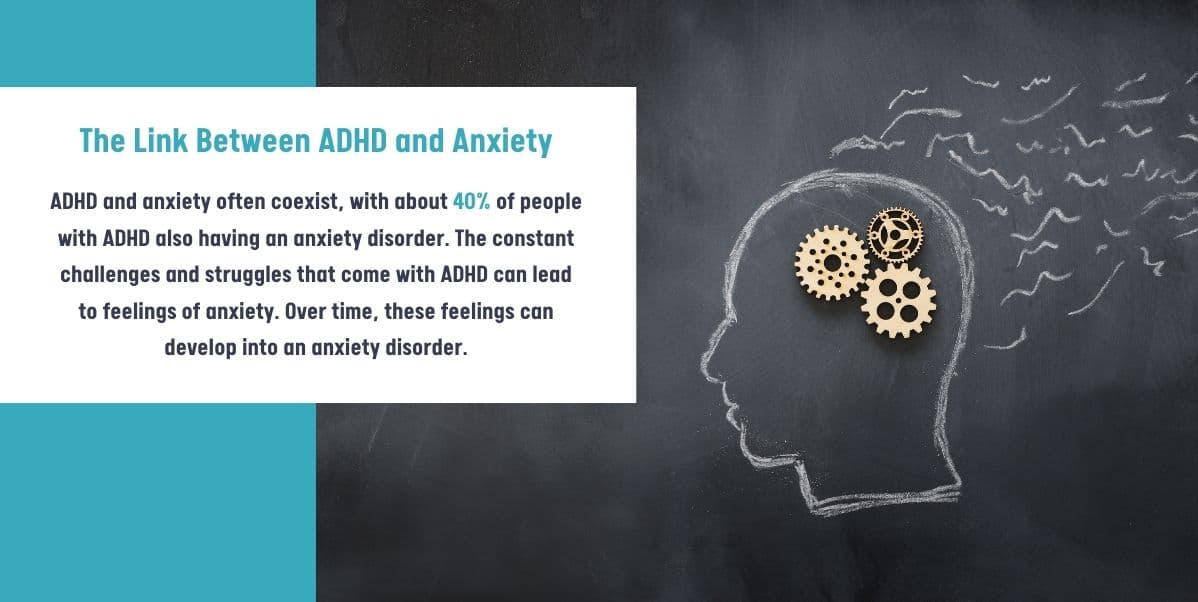
Mental health conditions often intersect and interact in complex ways. One such dynamic relationship exists between Attention-Deficit/Hyperactivity Disorder (ADHD), anxiety and depression.
In this article, we will explore the overlapping symptoms, shared risk factors, and the possible causal links between these conditions. Furthermore, we will discuss the importance of early detection, accurate diagnosis, and effective treatment strategies.
Whether you’re a healthcare professional, an individual living with ADHD, or simply someone looking to broaden your understanding of mental health issues, this article aims to provide valuable insights and deepen your knowledge about these interrelated conditions.
Understanding ADHD
Attention-Deficit/Hyperactivity Disorder, more commonly known as ADHD, is a chronic neurodevelopmental disorder that affects both children and adults. It’s characterized by persistent patterns of inattention, hyperactivity, and impulsivity, which can interfere with daily functioning and quality of life.
Development and Symptoms of ADHD
ADHD is typically first diagnosed during childhood, but its effects often extend into adulthood. This disorder is associated with differences in brain development and function, leading to difficulty controlling behavior.
Symptoms of ADHD include difficulty paying attention, hyperactivity, and impulsive behavior. These symptoms can result in challenges with academic, professional, and social aspects of life.
Long-Term Effects of ADHD
In terms of long-term effects, adults with ADHD can experience a range of difficulties. These include mood or conduct disorders, depression, and substance abuse.
Also, individuals with ADHD may struggle with maintaining focus at work or managing their time effectively, which can lead to underperformance in professional environments.
Understanding and managing ADHD involves recognizing its impact on all aspects of an individual’s life. With appropriate treatment and support, those with ADHD can lead successful and fulfilling lives.
The Link Between ADHD and Anxiety
ADHD and anxiety often coexist, with about 40% of people with ADHD also having an anxiety disorder. The constant challenges and struggles that come with ADHD can lead to feelings of anxiety. Over time, these feelings can develop into an anxiety disorder.
For instance, a child with ADHD may find it hard to focus in school, leading to poor academic performance. The child might then worry excessively about their grades and fear disappointing their parents, which could result in anxiety.
Similarly, adults with ADHD may struggle with time management and organization. This could lead to missed deadlines at work, resulting in job insecurity and increased anxiety.
In one case study, a 35-year-old woman with ADHD described feeling constantly overwhelmed by her inability to manage her tasks at work and home, leading to chronic anxiety and stress.

It’s important to note that while ADHD can contribute to the development of anxiety, each condition requires its own treatment. Therefore, it’s crucial for those experiencing both ADHD and anxiety to seek professional help to manage both conditions effectively.
Link Between ADHD and Depression
ADHD and depression often coexist, with studies suggesting that ADHD can increase the risk of depression later in life. The challenges and struggles associated with ADHD, such as difficulty focusing, impulsivity, and hyperactivity, can lead to feelings of sadness and despair, which over time can develop into depression.
For example, a child with ADHD may have difficulty keeping up with their peers academically due to their inability to focus. This constant struggle can lead to feelings of inadequacy and failure, potentially resulting in depression. Similarly, adults with ADHD may find it challenging to manage their responsibilities at work or home, leading to chronic stress and, eventually, depression.
Case Studies
One study highlighted the role of poor frustration tolerance in the relationship between ADHD and depression. Children with ADHD often face difficulties in handling frustration, which could contribute to the development of depressive symptoms.
Another study found that emotional regulation mediates the relationship between ADHD and depressive symptoms in youth. Youth with ADHD who struggle to regulate their emotions are at an increased risk for depression.
It’s important to note that each condition requires its own treatment, and professional help should be sought to manage both conditions effectively.
Dealing with ADHD, Anxiety, and Depression
Managing ADHD, anxiety, and depression requires a comprehensive approach that includes both self-care strategies and professional treatment.
Self-Care Strategies
Self-care strategies can include regular physical activity, which has been shown to reduce symptoms of ADHD and improve mood. Maintaining a healthy diet, getting enough sleep, and practicing mindfulness or relaxation techniques can also help manage these conditions.
However, while these strategies can be beneficial, it’s crucial to seek professional help.
Professional Treatment
A healthcare provider can diagnose these conditions and develop a personalized treatment plan. This may include medication, cognitive-behavioral therapy, or other therapeutic interventions.
For instance, stimulant medications are often effective in treating ADHD, while antidepressants can be used for both depression and anxiety. Cognitive-behavioral therapy can help individuals change negative thought patterns and develop coping strategies.
Early intervention is key in managing these conditions and preventing them from worsening over time. If you or someone you know is struggling with symptoms of ADHD, anxiety, or depression, it’s important to reach out to a healthcare provider as soon as possible.
Get Professional Treatment for Depression
Navigating the intricate relationship between ADHD, anxiety, and depression requires a nuanced understanding of the interplay between these conditions. Exploring innovative solutions is key to addressing the root causes, and one such promising option is Transcranial Magnetic Stimulation (TMS) therapy, available at My TMS.
As we unravel the complexities of these interconnected mental health challenges, it’s evident that conventional approaches may not always provide the comprehensive relief individuals seek. My TMS steps into this landscape with a cutting-edge therapy that directly influences brain activity, offering a non-invasive and drug-free alternative for those grappling with depression.
The transformative possibilities of TMS therapy extend beyond traditional methods, providing a beacon of hope for individuals on their journey toward mental well-being. My TMS stands as a testament to progress in the field, offering a path that goes beyond the ordinary.
For those wrestling with the challenges of ADHD, anxiety, or depression, TMS therapy at My TMS opens doors to a holistic approach to mental health. Every individual’s path to wellness is unique, and My TMS is dedicated to providing guidance and support at every turn. Consider the potential of TMS therapy—a beacon of hope shining brightly on the road to a more balanced and fulfilling future.
Take control of your mental health today. Call My TMS Therapy at (877) 548-8081 or fill out the contact form here to book an appointment.


